|
|
|
Sort Order |
|
|
|
Items / Page
|
|
|
|
|
|
|
| Srl | Item |
| 1 |
ID:
102415
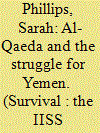

|
|
|
|
|
| Publication |
2011.
|
| Summary/Abstract |
In October 2010, explosives packed in the toner cartridges of two printers shipped from Yemen travelled on several passenger and cargo flights before their discovery in Britain and Dubai, hours before they were set to detonate. The incident followed the attempted bombing of an American passenger jet on Christmas Day 2009, traced to al-Qaeda in the Arabian Peninsula (AQAP), several of whose leaders have found refuge in Yemen's tribal periphery. This leadership has been targeted by US air-strikes, and Western policymakers have stressed the need for the Yemeni government to increase its capacity to deploy both carrots and sticks to undermine radical jihadism.
|
|
|
|
|
|
|
|
|
|
|
|
|
|
|
|
| 2 |
ID:
102419
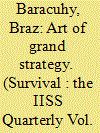

|
|
|
|
|
| Publication |
2011.
|
| Summary/Abstract |
It seems almost paradoxical that the study of 'grand strategy', broadly understood as the international vision pursued by the foreign policy of a state, has been to a large extent neglected by international-relations scholars. This lack of attention to a concept that is nearly intuitive to diplomatic practice says much about how International Relations (the field of study) became divorced from international relations (the real world of 'politics among nations', to borrow Hans Morgenthau's formulation). As the field moved away from its classical roots, international-relations theorists became obsessed with modelling politics after the natural sciences. The application of an economics paradigm to international politics saw states rendered as rational actors that maximise goals and respond to structural stimuli just as companies do in the market. Positional analysis became more important than strategic conception.
|
|
|
|
|
|
|
|
|
|
|
|
|
|
|
|
| 3 |
ID:
102411
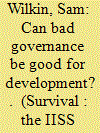

|
|
|
|
|
| Publication |
2011.
|
| Summary/Abstract |
That good governance is necessary for economic development was until recently the conventional wisdom. In 2002, for example, a USAID study asserted that 'without good governance, it is impossible to foster development'. The Economist's Africa editor, Robert Guest, wrote in 2004 that 'Africa's wars spring mostly from bad government … Bad governance is also the main reason why Africa is so poor.' Even Milton Friedman, a champion of market liberalisation, later endorsed the good-governance paradigm: 'I was wrong. It turns out that the rule of law is probably more basic [to development] than privatization.'
|
|
|
|
|
|
|
|
|
|
|
|
|
|
|
|
| 4 |
ID:
102416


|
|
|
|
|
| Publication |
2011.
|
| Summary/Abstract |
In 1997 a group of Chinese and American glaciologists extracted ice-core data from the world's highest site in central Tibet. Under harsh physical conditions, 7,200 metres above sea level, the team recovered three ice cores from the Dasuopu glacier that revealed current temperatures were the highest in a thousand years. Expeditions across the Tibetan Plateau have confirmed an accelerated warming trend that is leading to significant glacial retreat, especially on the northern slope of Mount Everest in the western Himalaya. If this trend persists, the humanitarian, economic and geopolitical consequences will be dire.
|
|
|
|
|
|
|
|
|
|
|
|
|
|
|
|
| 5 |
ID:
102405
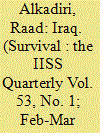

|
|
|
|
|
| Publication |
2011.
|
| Summary/Abstract |
The world breathed a sigh of relief at the announcement of a new Iraqi government on 21 December 2010. After nine months of wrangling following the 7 March elections, Prime Minister Nuri al-Maliki finally engineered a deal that kept him in place at the head of a 42-person cabinet. Maliki was unable to name a full coterie of ministers; ten of the portfolios, including the main security ministries, are being managed on a temporary basis by other ministers until permanent nominations are made. Nevertheless, approval of the cabinet brought to an end a crisis that left the political system in limbo and saw a deterioration of the security situation.
|
|
|
|
|
|
|
|
|
|
|
|
|
|
|
|
| 6 |
ID:
102407
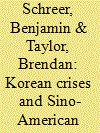

|
|
|
|
|
| Publication |
2011.
|
| Summary/Abstract |
For much of the past two decades, America's approach toward the Asia-Pacific has been seen by many as highly disjointed, the product either of strategic inattention or the push and pull of US domestic politics. Meanwhile, the rise of China has spawned a cottage industry asserting the existence of a carefully calibrated and highly calculated Chinese grand strategy for the Asian century. Rising China, according to this line, may be biding its time and hiding its capabilities, but it is ultimately bent upon displacing American power in Asia.
|
|
|
|
|
|
|
|
|
|
|
|
|
|
|
|
| 7 |
ID:
102421
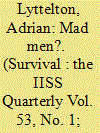

|
|
|
|
|
| Publication |
2011.
|
| Summary/Abstract |
The Madman theory remains a reliable conversation stopper in current strategic debates. Saddam Hussein had to be destroyed because deterrence was deemed unworkable against a tyrant presumed to be irrational. The same argument is now used regarding Iran's clerical regime, often with the added claim that national suicide is an insufficient disincentive for rulers obsessed by eschatological ends. In all such arguments, the temptation to play the Hitler analogy is rarely resisted. The comparison is usually fanciful, but if it is going to be used, we should at least get Hitler right. This is among several important things that Ian Kershaw does in his admirable book.
|
|
|
|
|
|
|
|
|
|
|
|
|
|
|
|
| 8 |
ID:
102410
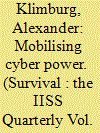

|
|
|
|
|
| Publication |
2011.
|
| Summary/Abstract |
Cyber crime, cyber terrorism and cyber warfare share a common technological basis, tools, logistics and operational methods. They can also share the same social networks and have comparable goals. The differences between these categories of cyber activity are often razor thin, or only in the eye of the beholder. From the perspective of a cyber warrior, cyber crime can offer the technical basis (software tools and logistic support) and cyber terrorism the social basis (personal networks and motivation)with which to execute attacks on the computer networks of enemy groups or nations.
|
|
|
|
|
|
|
|
|
|
|
|
|
|
|
|
| 9 |
ID:
102423
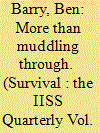

|
|
|
|
|
| Publication |
2011.
|
| Summary/Abstract |
During his tenure as the head of the British Army General Sir Richard Dannatt became the most controversial British military figure since the end of the Second World War, due to his high public profile, unmatched since that of Field Marshall Bernard Montgomery over 60 years earlier. Critics have charged that at times his behaviour went beyond the boundaries of the United Kingdom's unwritten constitution, and strategists and readers of Survival may have been put off from reading his memoirs by his appearances in the British media, or by his decision (about which he subsequently expressed regret) to accept an invitation to advise the then opposition Conservative Party shortly after he retired in 2009.
|
|
|
|
|
|
|
|
|
|
|
|
|
|
|
|
| 10 |
ID:
102417
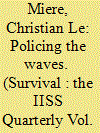

|
|
|
|
|
| Publication |
2011.
|
| Summary/Abstract |
In September 2010, the captain of a Chinese trawler that had been fishing in disputed waters near the Senkaku/Diaoyu islands, claimed by Japan, China and Taiwan, was detained by the Japanese Coast Guard after a collision between their vessels. A month later, nine Vietnamese fishermen were released after more than a month, having been arrested by Chinese maritime constabulary forces in disputed waters near the Paracel Islands in the South China Sea. In December, one Chinese fisherman was killed in a collision with the South Korean coast guard, which was trying to prevent illegal fishing.
|
|
|
|
|
|
|
|
|
|
|
|
|
|
|
|
| 11 |
ID:
102413


|
|
|
|
|
| Publication |
2011.
|
| Summary/Abstract |
The resolution of the great Cold War power struggle created a wave of optimism that modernisation, free-market globalisation and democratisation would extend the horizons of peace and prosperity across the world. These hopes were dashed by a progression of seemingly disjointed setbacks: economic crises, regional wars based on nationalism and ethnicity, and global crime and terrorism. Yet these varied challenges stem from common roots. The United States and its partners created a global political economy defined by the norms, institutions and power structures of 'bounded capitalism', providing the steadying influence of social-welfare policies in order to win societal support for building a regime of liberal international economic interaction. The structure of this world system is changing as the status quo powers face relative decline and new players enter the field, demanding adjustments. As developed and developing states deal differently with the problems of market development and welfare provision, the norms and precepts of the system are also in flux. Any attempt to deal with coming challenges must address the deeper social and economic transformations at work, rather than focusing piecemeal on their symptoms.
|
|
|
|
|
|
|
|
|
|
|
|
|
|
|
|
| 12 |
ID:
102408
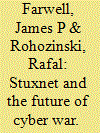

|
|
|
|
|
| Publication |
2011.
|
| Summary/Abstract |
The discovery in June 2010 that a cyber worm dubbed 'Stuxnet' had struck the Iranian nuclear facility at Natanz suggested that, for cyber war, the future is now. Stuxnet has apparently infected over 60,000 computers, more than half of them in Iran; other countries affected include India, Indonesia, China, Azerbaijan, South Korea, Malaysia, the United States, the United Kingdom, Australia, Finland and Germany. The virus continues to spread and infect computer systems via the Internet, although its power to do damage is now limited by the availability of effective antidotes, and a built-in expiration date of 24 June 2012.
|
|
|
|
|
|
|
|
|
|
|
|
|
|
|
|
|
|
|
|
|